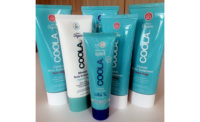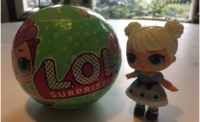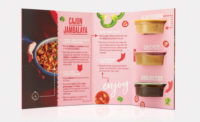Can Naked Packaging Clean up the Environment?


Lush conditioning bars last longer than bottled products.

Lush "naked" shower gels (or solids) are made by hand with fresh fruit, floral infusions, essential oils and are package-free.

Organic cotton knot-wraps are crafted by re-wrap, a women's cooperative in India, others are woven from recycled plastic bottles.

Whether lathered between hands or directly onto hair, a Lush shampoo bar can last up to 80 washes.





The average person uses nine personal care products each day. Chances are one of the nine products is body wash. In fact, it’s estimated that 232.46 million Americans used body wash in 2017. Regular soap (now referred to as bar soap) has fallen out of favor, and some believe millennials are to blame. The consumer-research firm Mintel found that 60 percent of 18-24 year olds believe bar soap to be “covered in germs after use.” Germs aren’t their only passion point, millennials also claim sustainability is a shopping priority. How sustainable is body wash packaging? Assuming a 10-ounce bottle provides approximately 30 washes means the average person uses 12 bottles per year. It also means 2.7 billion bottles are likely destined for landfills every year. That begs the question: Can you have your body wash and recycle the packaging too?
According to the Ellen MacArthur Foundation, the answer is yes. The New Plastics Economy, the foundation’s three-year initiative, is a global effort to rework the plastic system by using circular economy principles. More than forty leading corporations, including the Coca-Cola Company, MARS, and Unilever have endorsed the global action plan aimed at reducing the use of plastic packaging.
Many other companies are making an effort to use recyclable, recycled or plant-based packaging. For the hard-to-recycle items, there are personal recycling programs. TerraCycle is one company facilitating free personal recycling mail-in programs. Anyone can go online and choose the box size and category (e.g., personal care and beauty), fill it with the accepted waste and then ship it —with a pre-paid shipping label—back to TerraCycle for recycling. The process is not for the incrementally challenged, but it is
an option.
Another option is bypassing the packaging entirely. Instead of hoping there’s a recycling program for your shower products or waiting three years for a global initiative to take effect, millennials (and everyone else) can now have their body wash without the bottle.
Lush, a U.K.-based cosmetics retailer, introduced its solid or “naked” package-free product line that includes body wash (they call it solid shower gel) in late 2017. For those wondering, “Isn’t soap technically package-free body wash?” Lush would disagree. Although the product does resemble soap in looks and lather, it contains most of the same ingredients as liquid shower gel. It also lasts longer than other body wash products because it is double the concentrate.
The naked product line also includes shampoo bars, conditioner bars, henna hair color and massage bars, all created to reduce the amount of plastic bottles from being produced, transported and disposed of every year. For those preferring a little coverage for their naked products, knot-wraps are another alternative package option. Lush knot-wraps are reusable fabric made from Greenspun, a material created from recycled plastic bottles or from organic cotton. The wraps come in a variety of colors and patterns and can be reused as an accessory.
Although 46 percent of the nearly 700 products Lush produces are solid and displayed unpackaged, the company still relies on more traditional packaging for more than half of its products. The product packaging Lush does use is recycled, recyclable, reusable or made of compostable materials, including post-consumer recycled plastic bottles and biodegradable bags. The company is also currently working with environmental partners to collect ocean-bound plastics, and Lush has determined it can blend about 5 percent ocean-bound plastic with other post-consumer recycled material to create the little black pots that many of their products are packaged in.
Of course, by having its own retail stores Lush is able to create and manage a cradle-to-cradle system. Even with package-free markets popping up around the world, it’s unlikely we’ll see package-free beauty or personal products lining the shelves at retails such as Target anytime soon. Consumers who prefer soap to body wash can find brands such as Sappo Hill, sold in bulk without a label, barcode or packaging in the apothecary section of health food retailers such as Whole Foods Market.
Soap—packaged or not—still has its fans. After the Mintel finding, a wave of body wash backlash articles hit the web including, “Bar Soap is Totally Underrated—Liquid soap can go eff itself” from Racked; Why Do We Hate Bar Soap? Body Wash Reigns Supreme Among Millennials” on Bustle and “Blame Millennials for the Vanishing Bar of Soap” curtesy of CBSnews.com.
Lush isn’t the only company creating solids. Many are including Chagrin Valley Soap & Salve, which is a family owned and operated company in Ohio that crafts skin and hair care products (including shampoo, conditioner and lotion bars as well as traditional soap) that are USDA certified organic, sustainably produced, cruelty-free and ethically traded. The packaging it does use—paperboard, tin-plated steel tins, aluminum bottles, glass jars and 100 percent cellophane bags without added plastic or plastic coatings—are all easy and inexpensive to recycle.
Products ordered online from Chagrin are packaged with shredded recycled office paper. And if customers do not want protective packaging, they can leave a note in the comments box when checking out.
How does Lush package and ship products marketed as package-free? Solid shower gels are wrapped in NatureFlex, the biodegradable and compostable cellulose-based flexible packaging made from wood pulp from Futamura. Not exactly naked but close.
Looking for a reprint of this article?
From high-res PDFs to custom plaques, order your copy today!











